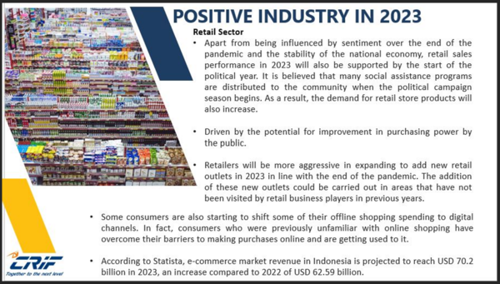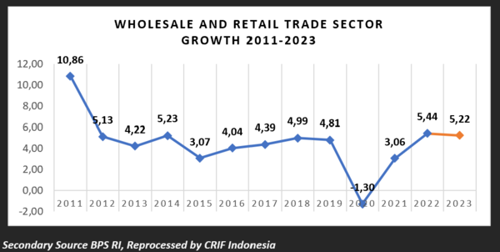Currently, the retail industry is still one of the businesses that forms a large supply chain for the community. This is because the retail business fulfils most of people's daily needs. According to the presentation of the Minister of Trade, Zulkifli Hasan, the performance of the retail sector has proven to have a major contribution in driving economic growth.
Currently, the retail industry is still one of the businesses that forms a large supply chain for the community. This is because the retail business fulfils most of people's daily needs. According to the presentation of the Minister of Trade, Zulkifli Hasan, the performance of the retail sector has proven to have a major contribution in driving economic growth. The retail sector is the main driver of household consumption, which accounts for 53.56% of gross domestic product (GDP). It can be concluded that the retail industry or business contributes greatly to the Indonesian economy. (https://news.ddtc.co.id/sektor-ritel-motor-utama-pertumbuhan-ekonomi-mendag-dorong-konsumsi)
Reflecting on the 2021 Global Retail Development Index (GRDI) issued by global consulting firm A.T. Kearney. Indonesia managed to rank fourth out of 35 selected countries around the world. GRDI is an index determined based on developments in the retail market. With a population of 272 million and national retail sales reaching USD 407 billion (IDR 6.044 trillion), the total GRDI value is 53.0. (https://www.kearney.com/global-retail-development-index)
Top 10 Country Global Retail Development Index 2021
|
Rank |
Country |
Market Attractiveness |
Country Risk |
Market Saturation |
Time Pressure |
Final 2021 Score |
|
1 |
China |
100.0 |
88.4 |
13.1 |
100.0 |
72.8 |
|
2 |
India |
59.1 |
50.7 |
63.7 |
82.7 |
64.4 |
|
3 |
Malaysia |
74.5 |
74.0 |
27.2 |
43.9 |
54.1 |
|
4 |
Indonesia |
51.3 |
30.7 |
57.6 |
60.7 |
53.0 |
|
5 |
Bangladesh |
15.7 |
2.4 |
96.0 |
88.4 |
53.0 |
|
6 |
Morocco |
31.5 |
92.6 |
66.5 |
51.8 |
52.2 |
|
7 |
Egypt |
34.3 |
20.5 |
71.5 |
73.8 |
52.0 |
|
8 |
Ghana |
13.5 |
70.2 |
96.5 |
52.7 |
51.9 |
|
9 |
Vietnam |
27.8 |
42.2 |
56 |
98.4 |
51.8 |
|
10 |
Dominican Republic |
44.5 |
70.2 |
62.2 |
39.7 |
51.4 |
Secondary Source Kearney.com synthesis and analysis, Reprocessed by Visi
Bank Indonesia predicts that the risk of inflation will still overshadow the Indonesian economy until 2023. The results of the Bank Indonesia Retail Sales Survey (BI) show that the General Price Expectation Index (IEH) for May 2023 is 140.2, down from 140.8 in the previous month. In line with expectations of reduced inflationary pressure, respondents expect retail sales to increase in May 2023. This is indicated by the Sales Expectations Index (IEP) for May 2022 which was 153.9 or an increase from 146.9 in the previous month. The May 2023 IEP increase was also driven by smooth distribution and favorable season conditions. (Nasional.kontan.co.id, January 10, 2023).
In the midst of these challenges, CRIF Indonesia views the retail sector as optimistic in line with the sustainable economic recovery. The domestic economy currently looks strong with the pandemic situation under control. Community mobility has also increased along with strong household consumption and is expected to continue until 2023.

The retail sector recovering from the pandemic is also predicted to remain prospective until early Q3/2023. MNC Sekuritas analysts assess that the controlled Covid-19 cases will eventually encourage the recovery of the retail sector. In Q3/2022, the retail sector's revenue rose 22.3% on an annual basis, driven by increased mobility and people's purchasing power. MNC Sekuritas analysts also estimate revenue and net profit in 2023 to increase to 44.7% year on year (YoY) and 32.6% (YoY), mainly due to better inventories before the pandemic, increased omnichannel strategy and sufficient cash to maintain liquidity. (Investasi.kontan.co.id, December 12, 2022).
Furthermore, the Indonesian Retailers Association (Aprindo) also assesses that retail sales performance growth will improve in 2023. The increased mobility of people is considered to have the potential to boost public consumption in retail shops. As a result, retail sales growth in 2023 is projected to reach around 4% or in line with Indonesia's economic growth which is estimated at around 5.5%. This projection is higher than Aprindo's estimated retail sales growth in 2022, around 3%-3.5%.
Apart from being influenced by sentiments over the end of the pandemic and national economic stability, retail sales performance in 2023 will also be supported by the start of the political year. It is believed that many social assistance programs are provided to the public when the political campaign season begins. As a result, the demand for retail store products will also increase. Retailers are also projected to expand more aggressively by adding new outlets in 2023, in line with the end of the pandemic. (Industri.kontan.co.id, January 1, 2023)
Based on Statistics Indonesia (BPS) data, the wholesale and retail trade sector apart from cars and motorcycles experienced a drastic decline in 2020, reaching -1.30 points compared to the previous year. This was caused by the Covid-19 pandemic which resulted in the cessation of most operations at the distributor and retail level in almost all regions and sectors in Indonesia. The pandemic has caused a decline in people's purchasing power to its lowest point, thus having a major impact on public consumption. However, along with the improving economic conditions and business operations in Indonesia, people's purchasing power is increasing again, and in 2021, the wholesale and retail trade sector is predicted to gradually recover and grow to 3.06%, in 2022 it reached 5.44% and it is estimated continues to grow despite a slowdown in 2023 to 5.22%.

As additional information, CRIF Indonesia considers that there are several factors influencing the upward trend in the retail sector in Indonesia, including the following:
1. Increased Use of Technology: The increasing use of technology such as e-commerce means that retail businesses must continue to adapt to these changes. This will open up greater opportunities for businesses in the retail sector.
2. Increasing People's Purchasing Power: Economic growth and increasing people's income will increase people's purchasing power, opening up opportunities for retail businesses to increase their sales.
3. Economic Development in Various Cities: Economic development in various regions, especially in big cities in Indonesia, will create demand for facilities and infrastructure, including retail shops. This will be an opportunity for the retail business to expand its distribution network.
4. Lifestyle Improvement: Indonesian people are paying more and more attention to lifestyle and fashion, making personalization and exchange of goods following trends. This will also encourage retail businesses to be able to offer their products to end users and facilitate the availability of these goods.
Thus, the retail industry in Indonesia in 2023 is predicted to experience positive growth but will also be faced with various challenges. However, this may change according to various factors affecting the economic and industrial conditions in Indonesia.
